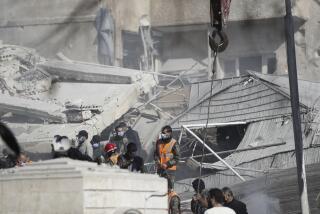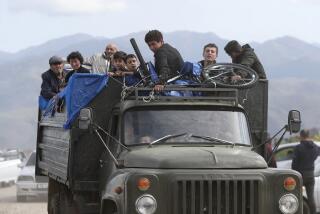Syria’s deputy oil minister Abdo Hussameddin reportedly defects
Syria’s deputy oil minister reportedly defected from the government of Bashar Assad on Thursday, and a high-level international peace envoy seeking a cease-fire in Syria warned against further “militarization” of the bloody conflict.
The reported move by Abdo Hussameddin — whose videotaped message abandoning the Assad administration was posted on YouTube — would be the highest-level civilian defection to date from the embattled government in Damascus, which is facing a yearlong rebellion, international isolation and a reeling economy.
On the video, shown widely on international news channels, Hussameddin says he can no longer overlook “the crimes of this regime.” He urges fellow officials to abandon “the sinking ship,” even though he says he anticipates that the government will burn his house and “persecute” his family.
“I am joining the revolution of the people who reject injustice and the brutal campaign of the regime,” says Hussameddin, a more than 30-year veteran of the nation’s important oil sector.
There was no official word from the government, and the authenticity of the video could not be independently verified.
Hussameddin presumably has considerable knowledge about insider dealings in the oil sector that are reputed to have enriched members of the president’s inner circle.
However, analysts were split over the significance of his reported defection.
Hussameddin is not regarded as especially close to the Syrian leadership. And his possible departure may be an isolated incident, not indicative of deeper fissures in the government.
But the defection would be a blow to the government’s narrative of cohesion and loyalty despite nearly a year of rebellion that has seen thousands killed and some areas of the country slip into the hands of armed rebels. The revolt has seen many defections from the Syrian military, but not of its highest-ranking officers.
On Thursday, news wire services quoted a rebel official as saying four more brigadier generals had defected to the opposition, bringing to seven the number of generals who have switched sides.
Pro-government websites and Facebook pages were already dismissing the importance of Hussameddin’s reported defection, describing him as corrupt, said one Syrian analyst.
The Syrian opposition hailed the reported defection, and a U.S. State Department spokeswoman, Victoria Nuland, said in Washington that the report would be “very good news” if true.
“This would be absolutely in keeping with the kind of calls that the secretary and the president have been making for senior members of the regime to break with Assad,” Nuland said.
But most analysts agree that Assad still has a unified inner circle, including many members of his Alawite sect, an offshoot of Shiite Islam. Some members of Syria’s Alawite minority have come to view the conflict as a fight for survival against a militant Islamist rebellion arising out of the nation’s Sunni Muslim majority and fanned by Sunni Persian Gulf states such as Saudi Arabia — one illustration of the many geopolitical dimensions of the Syrian conflict.
Saudi officials, who have publicly backed arming the Syrian opposition, view the fall of Assad as a prospective major blow against the kingdom’s regional nemesis, Iran, where Shiite Islam dominates. Tehran remains a close ally of Assad.
Some analysts fear a sectarian-tinged proxy war between Saudi Arabia and Iran in Syria should the conflict become an all-out civil war.
In Cairo, meanwhile, Kofi Annan, special envoy to Syria from the United Nations and the Arab League, said a political solution was needed for the Syria crisis. The former U.N. secretary-general warned against any moves that would escalate the violence in Syria.
“We have to be careful that we don’t introduce a medicine that is worse than the disease,” said Annan, who is scheduled to arrive in Damascus this weekend in an effort to craft a cease-fire.
“I hope no one is thinking very seriously of using force in this situation,” Annan said after meeting Arab League Secretary-General Nabil Elaraby. “I believe further militarization will make the situation worse.”
With his comments, Annan seemed to endorse negotiations with the regime, an approach that many opposition activists have rejected. The major opposition umbrella group, the Syrian National Council, has said the time for dialogue is over and Assad must step down — a position supported by many opposition activists.
Assad, whose family has ruled Syria for more than 40 years, has said he would never abandon his post and has vowed wide-ranging reforms, including a new constitution passed in a national referendum last month.
Many nations, including the United States and various Western and Arab allies, have also called on Assad to resign. But the White House has rejected the idea of providing arms to Syria’s rebels despite calls from some in Congress, including Sen. John McCain (R-Ariz.), to do so. The White House says it is still hopeful a political settlement will result in Assad’s departure.
Russia and China have rejected demands for Assad’s resignation and called for a negotiated settlement involving the Assad government and the opposition. The two nations have twice vetoed U.N. Security Council resolutions condemning Assad’s handling of the crisis. Both have approved of the former U.N. chief’s peace mission to Damascus, as has the Assad government.
In Syria, opposition activists said the killing continued in the embattled western city of Homs and elsewhere.
The Local Coordination Committees, an opposition network, reported at least 62 killed across the nation Thursday, including 52 in Homs. The group said 44 people were executed, part of a series of reprisal killings in Homs since March 1, when the Syrian army overran the former rebel enclave of Baba Amr, a Homs neighborhood. The government has denied the reports and accused “terrorists” of killing civilians and security personnel in Homs and elsewhere.
Reported death tolls cannot be confirmed because of restricted media access.
The conflict in Syria has left at least 7,500 dead, according to the United Nations. At least 2,000 law enforcement and military personnel have been killed, the Syrian government says.
Times staff writer Paul Richter in Washington and special correspondent Alexandra Sandels in Beirut contributed to this report.
More to Read
Start your day right
Sign up for Essential California for news, features and recommendations from the L.A. Times and beyond in your inbox six days a week.
You may occasionally receive promotional content from the Los Angeles Times.






